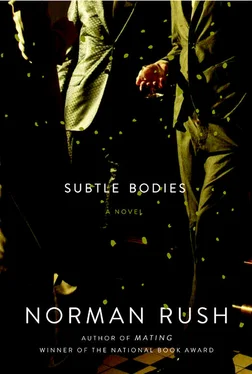Norman Rush
Subtle Bodies
For Elsa:
I hope you like being indispensable,
because nothing can be done about it.
Genitals have their own lives, his beloved Nina had said at the close of an argument over whether even the most besotted husband could be trusted one hundred percent faced with the permanent sexual temptations the world provided. It was the kind of conversation that went with the early days of a marriage, of their marriage. He had been rebutting her silly but fiendish thought experiments and had gotten tired of the game. She was a genius at imagining inescapable sex traps. There could be a nun suffering from hysterical blindness that would probably become permanent unless she received a sacrificial screw from somebody’s husband, alas. He looked around. Good thing there were no nuns on the plane, at least none in costume. When you’re traveling you’re nothing, until you land, which is what’s good about it, Ned thought.
Nina, riding in furious pursuit, felt like bucking in her seat to make the plane go faster through the night. She was still enraged. She felt like a baby. She thought, You are a baby: no, he is, he is, my lamb.
Maybe the matronly pleasant-seeming woman sitting next to her was wise . She was old enough to be. Anything was possible. And it might not hurt to talk to an adult other than my incessant mother, she thought. She had to call her mother when they landed, first thing. It’s just that she won’t shut up about my pregnancy, she thought. Her attempted pregnancy, was what she meant. She regretted telling her mother about it.
I love my mother, she wanted to tell the woman next to her. It was just that her mother was overflowing with pregnancy lore that had nothing to do with reality. She’d been unkind when her mother said, You smell differently when you’re pregnant, because she’d said in response, Oh really? How do you smell then? With your uterus? All her mother had been trying to say was that there was a change in the odor a woman’s body gives off during pregnancy. But then her mother regularly declared that there was a mystical “subtle body” inside or surrounding or emanating from every human being and that if you could see it, it told you something. It told you about the essence of a person, their secrets, for example. It was all about attending closely enough to see them. They varied in color and brightness. Her mother claimed she could see them, faintly. She wanted Nina not to be oblivious to the subtle bodies of the people she met. That would protect her from deceivers , whoever they might be. Ma suggested Ned be on the qui vive also.
Dinner, as they called it, was done with. She seemed to have twisted her napkin into a rope and she wondered if her seatmate had noticed. The woman wasn’t being especially friendly to her. Usually the people she happened to sit next to were.
Yes, she was enraged at Ned, but also felt sorry for him. May God help you my lad, my Ned, she thought. He would be dumbfounded when he realized she had sprung after him, done it, like that, like a savage beast dropping everything herself, the same as he had, like a child, an adolescent, a child. He had never seen her truly furious, never once in three years of marriage. He had seen her agitated, and he had seen her annoyed, but never this. I am war, she thought.
No question he deserved tenderness, which he got. On her own, she had quit referring to his beloved clique of college friends as clowns. He hadn’t asked her to, but the term had stung him, a little. And this despite the fact that they had been clowns manqué, a troupe, goofing on the world under the baton of their maestro Douglas.
She had to control herself. She needed to be calm and alkaline. She thought, I wonder if he thinks I love taking Clomid and standing on my head après sex, with him holding my feet in the air. He had left her a barely readable note. Twice since leaving he’d called her, and each time she’d answered, I am not answering this phone.
Every thing had been left for her to deal with, not only everything involving the nonprofits, not only the mis-sent invoices and the complaints about the metallic aftertaste of the coffee they were getting from their co-ops in Belize, but calls about the demonstration he was organizing, the same calls over and over again, because this was a coalition . She hated coalitions. And why did Ned have to be the Chair? She made an involuntary flinging-out gesture that startled her seatmate, who flinched. Nina tried to bury the gesture in a show of policing her tray table. She doubted that the woman was deceived. Ned could be annoying without meaning to. Talking about getting pregnant he had said, about his own attitude to it, I can’t decide whether I’m ambivalent or not. Which was a ghostly survival of the talky badinage-based humor of his circle of clowns, by which she meant friends, sorry. It was a slightly funny thing for him to say, but the subject wasn’t funny.
Nina had the window seat. She raised the window shade to study the night. Why did stadiums where no one was at play have to be lit up like Christmas, why? But why everything, really, and why had that woman writing her up in the Contra Costa Times described her as sharp-featured, why? Because she wasn’t. And why hadn’t the woman mentioned her award in the story saying that she was the best accountant the nonprofits in the Bay Area had ever heard of? She considered her reflection in the window. Why not angular , instead of sharp-featured?
Well she was going to take the bull by the horns and talk to her co-passenger. It was ordained that the woman’s wallet was going to be exploding with snapshots of unblemished grandchildren. She would deal with it. She needed to talk. She needed to be with Ned, now , before the thirty-six hours were up, so they could do it. Had he forgotten or did he just not care? About family making, he did feel old for it sometimes. He was forty-eight.
The woman beside her opened her purse and extracted a paperback, which she seemed to be handling rather reverently, like a missal. Nina was curious. The woman moved unsubtly away, taking her elbow off the common armrest.
Nina entertained the idea that the woman had sensed a core truth about her, which was that she always wanted to know what people were reading. I can’t help it, she thought. She always wanted to know. It had been embarrassing from time to time when people saw her craning around inappropriately to get a clue about what they were reading. It was just that knowing made her feel better. Somebody could be reading Mein Kampf . And she didn’t like people who covered the books they were reading in little homemade kraft paper jackets. She couldn’t help taking that as a challenge, apparently. Definitely the woman was getting tense. But she might as well relax, because Nina already knew what she was reading. She had figured it out in a glance. But I’m clumsy, she thought. Anxious, she thought it again. Then she passed her hands down her sides, for no reason.
The woman had bent the front cover of the paperback around to conceal the spine, and now she was slanting the book so that Nina would be required to contort herself to make out what was on the page. The woman’s dual mission seemed to be to read and at the same time keep what she was reading secret from Nina. It was silly because the cover art featuring embossed foil bolts of lightning and a cross on a blood-red field declared that the book was an entry in the genre of Christian theological thrillers that had gotten so popular. That was the last thing Nina needed to think about, the end of the world. Well, she couldn’t interrupt this person when she was reading. Because reading was sacred. It was to my mother, she thought. The number of times her mother had found her reading intently when it was time to set the table, and given her a pass, was legion.
Читать дальше











